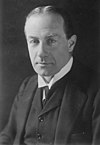Second Baldwin ministry
Appearance
Second Baldwin ministry | |
|---|---|
| 1924–1929 | |
 Stanley Baldwin (1920) | |
| Date formed | 4 November 1924 |
| Date dissolved | 4 June 1929 |
| People and organisations | |
| Monarch | George V |
| Prime Minister | Stanley Baldwin |
| Total no. of members | 114 appointments |
| Member party | Conservative Party |
| Status in legislature | Majority 412 / 615 (67%) |
| Opposition party | Labour Party |
| Opposition leaders |
|
| History | |
| Election | 1924 general election |
| Outgoing election | 1929 general election |
| Legislature terms | 34th UK Parliament |
| Predecessor | First MacDonald ministry |
| Successor | Second MacDonald ministry |
Stanley Baldwin of the Conservative Party formed the second Baldwin ministry upon his reappointment as Prime Minister of the United Kingdom by King George V after the 1924 general election. His second ministry ended following the so-called "Flapper Election" of May 1929.
Cabinet
[edit]November 1924 – June 1929
[edit]- Stanley Baldwin – Prime Minister and Leader of the House of Commons
- The Viscount Cave – Lord High Chancellor of Great Britain
- The Marquess Curzon of Kedleston – Leader of the House of Lords and Lord President of the Council
- The Marquess of Salisbury – Lord Keeper of the Privy Seal
- Winston Churchill – Chancellor of the Exchequer
- Sir William Joynson-Hicks – Secretary of State for the Home Department
- Sir Austen Chamberlain – Secretary of State for Foreign Affairs and Deputy Leader of the House of Commons
- Leo Amery – Secretary of State for the Colonies
- Sir Laming Worthington-Evans – Secretary of State for War
- The Earl of Birkenhead – Secretary of State for India
- Sir Samuel Hoare – Secretary of State for Air
- Sir John Gilmour – Secretary for Scotland
- William Clive Bridgeman – First Lord of the Admiralty
- The Viscount Cecil of Chelwood – Chancellor of the Duchy of Lancaster
- Sir Philip Cunliffe-Lister – President of the Board of Trade
- Edward Frederick Lindley Wood – Minister of Agriculture
- Lord Eustace Percy – President of the Board of Education
- The Viscount Peel – First Commissioner of Works
- Sir Arthur Steel-Maitland – Minister of Labour
- Neville Chamberlain – Minister of Health
- Sir Douglas Hogg – Attorney-General for England and Wales
Changes
[edit]- April 1925 – On Curzon's death, Lord Balfour succeeded him as Lord President. Lord Salisbury became the new Leader of the House of Lords, remaining also Lord Privy Seal.
- June 1925 – The post of Secretary of State for Dominion Affairs was created, held by Leo Amery in tandem with Secretary of State for the Colonies.
- November 1925 – Walter Guinness succeeded E.F.L. Wood as Minister of Agriculture.
- July 1926 – The post of Secretary of Scotland was upgraded to Secretary of State for Scotland.
- October 1927 – Lord Cushendun succeeded Lord Cecil of Chelwood as Chancellor of the Duchy of Lancaster
- March 1928 – Lord Hailsham (former Sir D. Hogg) succeeded Lord Cave as Lord Chancellor. Hailsham's successor as Attorney-General was not in the Cabinet.
- October 1928 – Lord Peel succeeded Lord Birkenhead as Secretary of State for India. Lord Londonderry succeeded Peel as First Commissioner of Public Works
List of ministers
[edit]Members of the Cabinet are in bold face.
- Notes
- ^ Created Viscount Hailsham 4 July 1929.
- ^ Also Leader of the House of Lords.
- ^ Also Leader of the House of Lords 27 April 1925 – 4 June 1929.
- ^ Created a Baronet 28 June 1928.
- ^ Knighted 1 December 1925.
- ^ Became Secretary of State for Scotland 15 July 1926.
- ^ Office abolished 26 July 1926.
- ^ Changed surname to Cunliffe-Lister 17 November 1924.
- ^ Created a Baronet 24 January 1927.
- ^ Created a Baronet 28 March 1929.
References
[edit]- D. Butler and G. Butler (ed.). Twentieth Century British Political Facts 1900–2000.
- ^ J C Sainty 'Assistant Whips 1922–1964' in Parliamentary History Vol 4 (1985) pp 201–04


